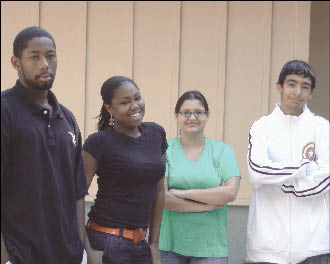 |
|
Standing on their own: Youths at Mi Casa, where those aging out of foster care develop skills to make it on their own. Photo: Mi Casa |
Concord, Calif.
(925) 825-1060, ext. 12
http://www.lssnorcal.org
Objective: Helping homeless former foster youth become self-sufficient.
In a Nutshell: Mi Casa is a transitional living program that provides comprehensive case management to youths who have aged out of foster care and are homeless. Case managers assist participants in devising and maintaining an individual case plan that includes housing, education, employment and financial management goals. Clients must participate in case management, pursue a GED or degree, obtain a job and remain clean and sober.
When and Where It Happens: Mi Casa comprises 10 beds in two adjacent houses in Concord, Calif., which is located between Sacramento and the Bay Area. Youth can stay at Mi Casa for up to two years.
Who Started It and Who Runs It: Mi Casa is one of several housing programs created and operated by Lutheran Social Services of Northern California (LSS-NORCAL), which serves more than 2,000 people in five counties. The nonprofit submitted a grant application in January 2006 to purchase and renovate the house that now hosts Mi Casa, and the program accepted its first clients in February 2006. Amy Lawrence, who also supervises a Sacramento program for emancipated foster youth, is the program manager and oversees a staff that includes two case managers, a crisis manager and an overnight peer counselor.
Overcoming Obstacles: Financing, property acquisition and construction were major challenges during the two-year planning process for the Mi Casa housing program. LSS-NORCAL administrators created a broad coalition of support among government, community and church officials. This coalition helped them get the initial property grant and the additional financing it has secured, according to Sue Laliberte, deputy director of LSS-NORCAL’s Sacramento office.
Cost: The 2008 operating budget is $352,484. This includes, approximately: $105,000 in housing costs, $115,000 in staff salaries, $55,000 in household expenses (utilities, phone and Internet, etc.), $32,000 on client assistance and other youth-related costs, $20,000 in administrative costs, $12,000 in monthly stipends for youth and $7,484 in transportation.
Who Pays: Transitional Housing Placement Plus (THP-Plus) funds from the State of California through Contra Costa County, the Firedoll Foundation and the fraternal programs division of Thrivent Financial for Lutherans. Also, 20 percent of a youth’s paycheck is taken by Mi Casa for rent; another 10 percent is put in a savings account.
Youth Served: Mi Casa serves homeless emancipated foster youth, from ages 18 through 24. LSS does not discriminate based on gender, race, nationality, origin or lifestyle preferences. As of October, the program is serving nine youths, all of whom aged out of foster care at 18. Asked to describe the youths at Mi Casa, Laliberte says: “They are male and female; of varied racial backgrounds; most have experienced abuse and/or neglect when they were young; some have had positive foster care experiences but many have not and continued to experience harm; some have the skills needed to be successful in school or in employment, but many have never had the support or role modeling to develop the needed life skills.”
Youth Turn-On: Assistance with educational and employment goals, housing, the stipend and a savings account for permanent housing.
Youth Turn-Off: The program’s guest policy prohibits overnight guests.

























